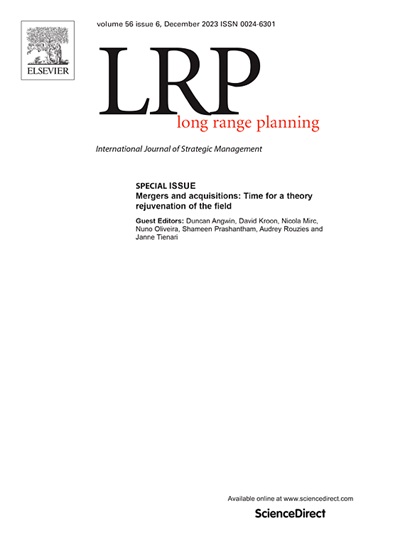Enhancing digital transformation in SMEs: The dynamic capabilities of innovation intermediaries within ecosystems
IF 6.3
2区 管理学
Q1 BUSINESS
引用次数: 0
Abstract
While the dynamic capabilities framework discusses the sensing, seizing, and transformation capabilities of organisations, we lack knowledge of the specific dynamic capabilities of intermediaries that support collaborations leading to the digital transformation of small and medium enterprises (SMEs). The specific role of intermediaries supporting collaboration between SMEs and the ecosystem, the unique barriers confronted by SMEs, and the long-term focus required for digital transformation suggest that intermediaries should deploy specific dynamic capabilities. By conducting in-depth interviews with innovation intermediaries, SMEs, and other ecosystem actors in the Ostrobothnia region of Finland, we make three original contributions to the dynamic capability framework. First, while the literature has discussed spotting opportunities and bringing partners together as sensing dynamic capability, we make an original contribution by demonstrating the ‘ancillary opportunity spotting capability’ of intermediaries. This includes intermediaries spotting opportunities to develop digital technologies to address business, environmental, or social challenges of ecosystem actors (e.g. developing carbon-neutral solutions) where SME digital transformation is only indirectly achieved: hence, this is described as an ancillary opportunity. Second, while the literature has discussed that the seizing capability involves exploiting opportunities by using resources, we identified that intermediaries leverage ‘business model co-creation capability’ for seizing. This predominantly consists of them co-creating – with the stakeholders of SMEs (i.e. customers, suppliers, and competitors) – the business models of SMEs for digital transformation. Third, as a transformation capability, intermediaries leverage ‘ecosystem revamping capability’ for continued and scaled-up SME digital transformation, the capabilities associated with which include altering opportunity and ecosystem structures, bridging inter-ecosystem collaborations, and deploying international best practices. Our finding has implications for intermediaries, SMEs, and policymakers keen to enhance SME digital transformation by enabling intermediaries to develop required dynamic capabilities.
加强中小企业数字化转型:生态系统内创新中介机构的动态能力
虽然动态能力框架讨论了组织的感知、抓住和转换能力,但我们缺乏对支持协作导致中小企业(sme)数字化转型的中介机构的具体动态能力的了解。中介机构支持中小企业与生态系统之间协作的具体作用、中小企业面临的独特障碍以及数字化转型所需的长期关注表明,中介机构应该部署特定的动态能力。通过对芬兰Ostrobothnia地区的创新中介机构、中小企业和其他生态系统参与者进行深入访谈,我们对动态能力框架做出了三个原创性贡献。首先,虽然文献已经讨论了发现机会和将合作伙伴聚集在一起作为感知动态能力,但我们通过展示中介的“辅助机会发现能力”做出了原创性贡献。这包括中介机构发现开发数字技术的机会,以解决生态系统参与者的商业、环境或社会挑战(例如开发碳中和解决方案),而中小企业的数字化转型只能间接实现:因此,这被描述为辅助机会。其次,虽然文献已经讨论了抓住能力包括通过使用资源来开发机会,但我们发现中介利用“商业模式共同创造能力”来抓住机会。这主要包括他们与中小企业的利益相关者(即客户、供应商和竞争对手)共同创造中小企业数字化转型的商业模式。第三,作为一种转型能力,中介机构利用“生态系统改造能力”来实现持续和扩大的中小企业数字化转型,与此相关的能力包括改变机会和生态系统结构,弥合生态系统间的合作,以及部署国际最佳实践。我们的发现对中介机构、中小企业和政策制定者具有启示意义,这些政策制定者希望通过使中介机构发展所需的动态能力来促进中小企业的数字化转型。
本文章由计算机程序翻译,如有差异,请以英文原文为准。
求助全文
约1分钟内获得全文
求助全文
来源期刊

Long Range Planning
Multiple-
CiteScore
13.00
自引率
7.10%
发文量
75
期刊介绍:
Long Range Planning (LRP) is an internationally renowned journal specializing in the field of strategic management. Since its establishment in 1968, the journal has consistently published original research, garnering a strong reputation among academics. LRP actively encourages the submission of articles that involve empirical research and theoretical perspectives, including studies that provide critical assessments and analysis of the current state of knowledge in crucial strategic areas. The primary user base of LRP primarily comprises individuals from academic backgrounds, with the journal playing a dual role within this community. Firstly, it serves as a platform for the dissemination of research findings among academic researchers. Secondly, it serves as a channel for the transmission of ideas that can be effectively utilized in educational settings. The articles published in LRP cater to a diverse audience, including practicing managers and students in professional programs. While some articles may focus on practical applications, others may primarily target academic researchers. LRP adopts an inclusive approach to empirical research, accepting studies that draw on various methodologies such as primary survey data, archival data, case studies, and recognized approaches to data collection.
 求助内容:
求助内容: 应助结果提醒方式:
应助结果提醒方式:


